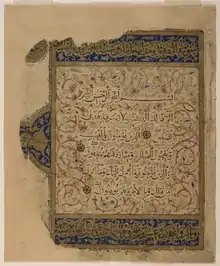Al-Baqarah
Al-Baqarah, ("The Heifer" or "The Cow"), is the second and longest chapter (surah) of the Quran.[1] It consists of 286 verses (āyāt).
| البقرة Al-Baqarah The Heifer | |
|---|---|
| |
| Classification | Medinan |
| Position | Juzʼ 1–3 |
| No. of Rukus | 40 |
| No. of verses | 286 |
| Opening muqaṭṭaʻāt | Alif lam Meem |

First verses of al-Baqarah
Summary
- 1-20 Unbelievers and hypocrites reproved
- 21-38 Exhortation to the worship of the true God
- 39-102 Jews and Christians urged to accept the claim of Muhammad to be a prophet of God
- 102-112 The opposition of Jews and Christians to Muhammad’s prophetic pretensions combated
- 113 The doctrine of abrogation enunciated
- 115 A Qibla declared to be redundant
- 116-141The Jews denounced and the religion of Abraham declared to be the true Islam
- 142-153 The Jews finally abandoned and the Arabs accepted by the adoption of Makkah as the Qibla of Islam
- 154-163 The Bereaved friends of those slain at the Battle of Badr comforted
- 164-172 Makkans exhorted to faith in God, and directed to observe the law respecting forbidden meats
- 173-176 Law concerning lawful and unlawful food (delivered at Madina)
- 177 The sum of Muslim duty
- 178-179 The law of retaliation
- 180-182 The law concerning bequests
- 183-185 The law concerning fasting
- 186-187 The fast of Ramadan
- 188-202 The pilgrimage to Makkah and war for the faith
- 203-206 Hypocrites and true believers contrasted
- 207-208 Exhortation to a hearty acceptance of Islam
- 209 The doom of infidels pronounced
- 210-212 The Jews reproached
- 213 Suffering to be patiently endured
- 214-242 Sundry laws relating to almsgiving, war, wine, orphans etc.
- 243-253 The duty of warring in defence of religion enjoined by precept, and illustrated by the history of former prophets
- 255 The Throne Verse
- 256-257 Laa ikraha fid deen.
- 258-260 The doctrine of the resurrection illustrated
- 261-274 Exhortation and encouragement to almsgiving
- 275-277 Usury forbidden
- 278-283 Debts in Islam including the longest verse in the Quran
- 284-286 The three verses of Paradise.[2]
References
- Salwa M. S. El - Awa, Introduction to Textual Relations in Qur'an, pg. 1. Part of the Routledge Studies in the Qur'an series. London: Routledge, 2005. ISBN 9781134227471
- Wherry, Elwood Morris (1896). A Complete Index to Sale's Text, Preliminary Discourse, and Notes. London: Kegan Paul, Trench, Trubner, and Co.
 This article incorporates text from this source, which is in the public domain.
This article incorporates text from this source, which is in the public domain.
Other websites
Wikisource has original writing related to this article:
- Q2:30, 50+ translations, islamawakened.com
- "The Cow", a manuscript, dating from the 13th-century, of the al-Baqarah via the World Digital Library
- Qur'anic Verses, a manuscript for al-Baqarah from the 13th-century
This article is issued from Wikipedia. The text is licensed under Creative Commons - Attribution - Sharealike. Additional terms may apply for the media files.